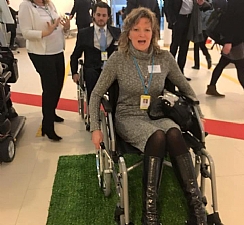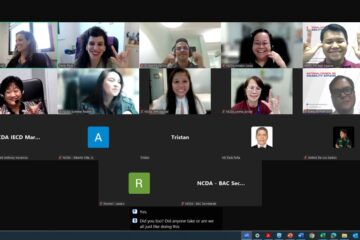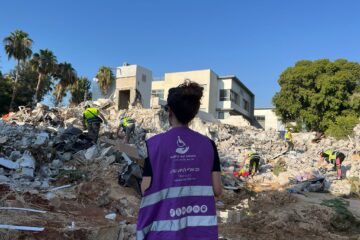In the Vienna Zero project Convention that closed on February 12, Some 550 participants from around 100 countries worldwide walked through Access Israel’s Accessibility Path, allowing participants to experience various disabilities, and exposing them to Israel’s challenges and accomplishments on its road to becoming accessible and integrating.
Access Israel (AI) also held a Meal of the Senses for 20 diplomats from UN institutions in Vienna and different countries, where AI’s representatives use a unique concept, developed by AI and implemented worldwide with various domestic and international audiences. The dinner was facilitated by Israeli Ambassador in Vienna, Ms. Talia Lador-Fresher, and the embassy staff.
A meal of the senses for diplomats
A meal of the senses is a unique, emotional experience, where dinners can experience first-hand the loss of senses and/or physical restriction.
The diplomats were in for a shaking experience: they entered the dining room blindfolded, their hand on the shoulder of the person in front of them; they sat in their chairs and only then began to familiarize themselves – without seeing – with the table and the layout of objects. A wine blind taste, the first course and glasses of drink were served in this state.
During main course, they were given giant gloves that restricted their motorics, making cutting the steak or holding the silverware awkward and nearly impossible.
With their ears covered to block hearing, the diplomats were then asked to choose a dessert from a selection of several alternatives that was presented to them by waiters.
Apart from the culinary experience, the meal of the senses is designed to raise awareness to the general issue of accessibility, and to provide a glimpse of the world of disabled people, who want to experience and enjoy life just like everyone else.
Throughout the meal, AI’s delegates, some of them disabled themselves, enriched the overall experience with captivating explanations and insights, both serious and entertaining.
Participants were extremely cooperative, and it was obvious that the experience was profound and meaningful. They shared personal stories about having to deal with inaccessibility in their own countries; they gained strength – and some valuable tips – from AI’s delegates, who shared stories of their own. At an early stage of the dinner, the Cyprus representative said, “I’m in! Please tell me what I can do to help you and help out the cause.” The Austrian representative, himself wheelchair bound and with limited hands operation, found it astounding that in a course of a single dinner, AI’s people got everyone to listen, cooperate and even enjoy themselves, despite the challenging situation, saying, “you have succeeded in relating a difficult issue in a fun, exiting and illuminating way!”. Scheduled to last an hour and a half, the dinner went on and on, and after three hours, some of the guests still wanted to stay on, asking questions about accessibility in Israel and accessibility al large.
Israel shows the world what accessibility is
The annual ESSEL Zero Project convention is an international platform for innovations and technologies intended to improve disabled people’s quality of life. Hundreds of accessibility experts, disability rights promoters and advanced technologies experts from all over the world get together to share information, hold discussions, present ideas and get updated in all the latest innovations as well as the quality of life of disabled people in other countries.
Each such annual Zero Project convention focuses on a study of a specific topic from the UN’s CRPD (Convention on the Rights of Persons with Disabilities), and a summary report about that topic is published at the end of the convention.
This year’s focal theme waseducation&digital accessibility, with one super goal in mind – a world without barriers.
Mr. Sar-El Oren-Ochana, the head of AI’s sign language department and founder of Pass it forward in Sign Language, was chosen out of hundreds of accessibility experts worldwide to speak on a special panel and present this unique project, where thousands of Israelis learn basic Israeli Sign language (ISL) and go on to teach it to others. This method has resulted in thousands more people joining the trend of learning the basics and being able to converse and communicate with the deaf community in Israel. The purpose of this project is to get the idea of language accessibility across, bringing change to the lives of deaf and hearing-impaired people worldwide. During the convention, AI’s representatives were approached by delegates from Cambodia and Kenia, who were interested in implementing Pass it forward in Sign Languagein their countries.
Architect Sagit Chaklai, recipient of the 2015 SimchaLustigAccess Israel Award for exemplary accessing of the Lunada Museum in Beer Sheba, was granted a visit to this convention.
During the convention, AI’s delegates met with several international dignitaries:
- The Jordanian Prince,HRH Prince Mired Raad Zeid AL-Hussein. The parties presented the accessibility status in their respective countries, and AI’s delegates proposed a special cooperation in social accessibility in the educational system, inviting the Jordanian prince to the Israel 4thAccessibility Convention on Tourism, Transportation, Culture & Leisure;
- Saudi Princess Merza Haian Merza, who welcomed the opportunity to form connections and promote global integration of disabled people who face the same stigma and difficulties wherever they are;
- Mr. David M. Capozzi, of the US Access Board, who was impressed by Israeli accessibility legislation, and wanted to learn more about issues currently reviewed in the US; and
- Ambassador Luis Gallegos Chiriboga, one of the leaders of the October 2016 Habitat III Convention to be sponsored by the UN and held in Quito, Ecuador, which is intended to include several sessions on urban accessibility. The Ambassador welcomed the Israeli initiative and participation Israeli attendance and initiative in the ESSEL convention, and expressed his hope of further Israeli contribution.
Michal Rimon, CEO of Israel Access Association and a member of the delegation explained: “Israel has a long way to go until full accessibility for all types of disability is achieved, but as a society in general and with regards to accessibility in particular, Israel has a lot to be proud of. We are happy to rise to the challenges of promoting accessibility on a global level and promoting Israel as an accessible country, all in a positive, humane and moving way.”
Upon saying farewell to Zero Project founder, Mr. Martin Essel, Mr. Rani Binyamini, AI’s co-founder and treasurer, and AI’s CEO, Michal Rimon, said that in addition to the significant professional contribution to its participants, the Zero Project Convention facilitated connections, dialogues and cooperation, which conventional diplomacy would struggle to accomplish. During summations, we expressed our gratitude and appreciation for the opportunity to do our part and to contribute to the success of the convention.
Thanks
We wish to thank Dr. Michael Fembek, and the founder of the ESSL Fund, Mr. Martin Essl, who helped bringing our delegation to the Vienna convention. We also wish to thank Taldor USER1ST, and Eyal Zipuim Ltd, who sponsored the delegation, helping us in representing AI and Israel in the best possible way.
Further thanks to Israeli Ministry of Foreign Affairs for their assistance; to hearing aids supplier Mehalev; to Milstone Surfacing; to the Milbat Association; to Caesar Computers, and to Professor Amir Amedi and his Hebrew University team for providing the demonstration equipment and tools.
Finally, we extend our gratitude to the delegation and AI team for their significant part in the success of this trip, which was another important step towards raising global awareness to the issue of accessibility in Israel and in other countries.







